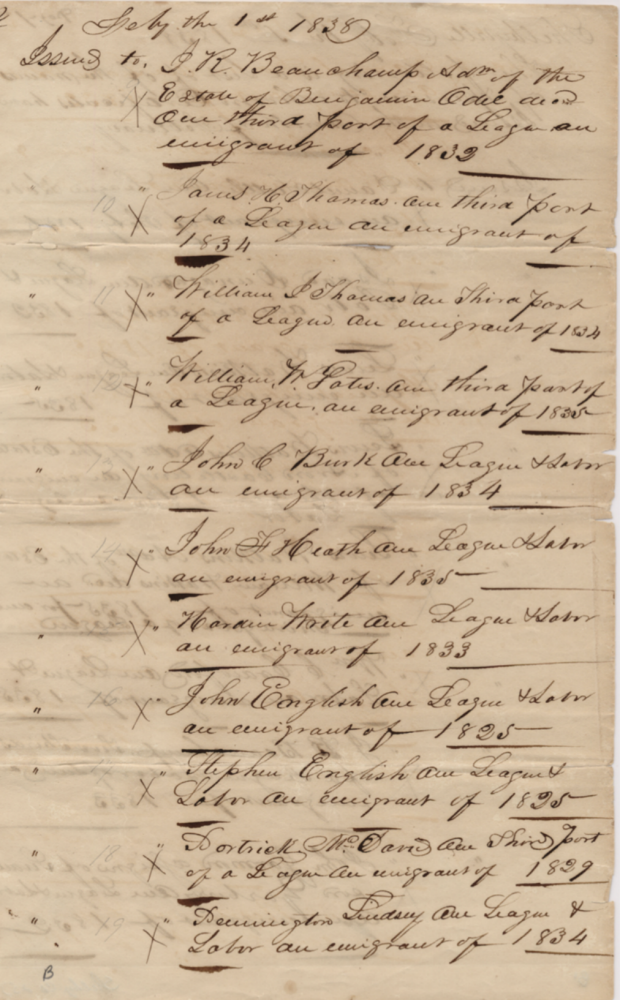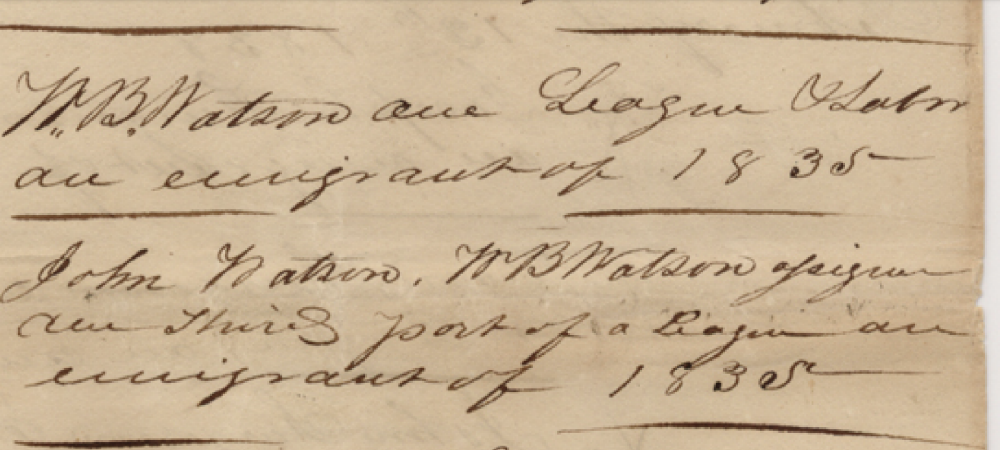William H. Watson
by Marylee Watson KnightWilliam H. Watson was born in or around Bardstown, Nelson County, Kentucky ca 1805-1806. He was the son of James Watson and Catherine (Coffman) Watson.
It is alleged that when he first left Bardstown, he went to Illinois for a time, presumably to where some of his relatives lived. Family legends say that, during this visit, William participated in the Black Hawk Wars.
He may or may not have returned to Bardstown before striking out for Texas. There is no record or whether he came alone or if he traveled with others. However, some family members insisted that he came alone, a devil-may-care adventurer, riding bravely alone through the wilderness. If he came alone and truly aimed for East Texas as his destination, it might have been because, at that time, this area was known as a "No Man's Land". The strip on either side of the present day Texas-Louisiana border was jointly claimed and ignored by first the Spanish and French governments, later by the Mexican and French and, still later, by the Mexican and United States. Not only was the ownership of the area hotly disputed, it was so sparsely inhabited and so remotely located that none of the governments really had much interest in controlling it. A court system and law enforcement was nonexistent so it became a haven for people on the run from problems in other parts of the country.
The first official record of William in Texas comes in the 1835 Census of the Sabine District of the Republic of Texas. He is listed as a single man, age thirty. Shortly thereafter, he joined the Army of the Republic of Texas, enlisting in New Orleans according to official documents. It is not known if he did, in fact, journey to New Orleans to enlist or if he signed documents in the Republic that were later taken to New Orleans for processing. According to his discharge papers, William was a Sergeant and Wagon Master in Company D of the Second Texas Volunteers. He was discharged in January of 1838.
He next appears in official documents when on August 3, 1838 in Shelbyville, Shelby County TX he was granted the one-third part of a League of land (1,476.1 acres). This deed states that William was an immigrant of March 1835. He sold this land to Mathus (or Matthew) Brinson on December 21, 1838. (File: Bex 1-1710, General Land Office, Austin TX)
Only 23 days after receiving the first land grand, William received Headright Certificate #151, also in Shelbyville, for one League and one Labor of land (4,605.5 acres). This certificate was dated August 26, 1838. This certificate states that William immigrated to the Republic of Texas in 1832. (File: Shelby 1-342, General Land Office, Austin TX) Both this parcel and the previous one were in the general vicinity of Shelbyville.
The significance of these two grants is that it places an approximate date on William Watson's marriage to Nancy Barcenia Lindsey. It is known that they obtained their marriage license in Shelbyville, but a long-ago courthouse fire destroyed all of the area's early records. Under the Republic of Texas Constitution of 1836, single men aged seventeen years or older and living in Texas on March 4, 1836 (except Africans and Indians) were granted one-third of a League of land, while all heads of families were granted "First Class" Headrights of one League and one Labor. Nancy was the daughter of John Lindsey and Catherine (?) Lindsey and was born ca 1815 in Tennessee.
It was probably during this time period that William became close friends with the Rev. Littleton Fowler, an early Methodist circuit rider who came to San Augustine (near Shelbyville) in 1837. Their friendship lasted a lifetime according to family stories, ending with Fowler's death in January 1846. In 1849 William memorialized that friendship by naming one of his sons Joseph Fowler Watson.
In the first election of county officers after Shelby County was organized, William was elected Sheriff on February 4, 1839 and commissioned in April 1839. He remained in office until 1844 when Amon Lewellen became Sheriff.
During William's tenure as Sheriff, a serious disturbance broke out in East Texas somewhere around the beginning of 1842. It began over charges of land fraud and Sheriff Watson was evidently an active participant in some of the subsequent events. Shelby County, which then included a large portion of East Texas, became two armed camps known as the "Regulators" and the "Moderators". The whole area was filled with the terrors of vigilante raids and night riders. In the ensuing two years some 50 men were reported to have been killed and all official courts ceased to function. Texas President Sam Houston quieted the disturbance in 1844, but the personal bitterness lasted for many more years.
Although numerous publications have discussed and analyzed the Regulator/Moderator Dispute in the century since it occurred, there is still no consensus of opinion as to who were the "Good Guys" and who were the "Bad Guys". By all accounts, both sides put forth lofty ideals, but conducted thmselves in a less than noble manner.
There is no family story as to whether William was a Regulator or a Moderator; it was merely handed down that he was on the "losing side", so along with a number of others, he found it advantageous to travel, or at least, to stay away from Shelbyville and Nacogdoches.
So, William rode north to the city of Marshall, in Harrison County. There he traded a horse and a saddle for some land that is now within the city of Marshall. He also homesteaded some land in the southwest part of Harrison County. Later, when the political situation cooled off, he returned to some of his old haunts, but never again lived south of present-day Panola County.
On February 4, 1850 his wife Nancy received a deed to her part of the estate of her mother, Catherine Lindsey. Nancy's share amounted to 500 acres and was located in the Holland's Quarters Community of Panola County, approximately six miles due west of the city of Carthage. This land was to be the home of William and Nancy for the balance of their lives. They reared their children there and died there, but were buried in Old Macedonia Cemetery located on the adjacent land headrighted by Sihon House.
William was an active participant in the affairs of the local Masonic Lodges according to the official records of the Grand Lodge of Texas. He is first shown to have been initiated into the Joppa Lodge #65 in Elysian Fields, Harrison County TX on January 10, 1852, Passed February 14, 1852, Raised: March 10, 1852, Secretary: 1852-1853, Junior Steward: 1854, Treasurer: 1855, 1857, 1858 and 1859, then Demitted: February 11, 1860. After that he was affiliated with the Carthage Lodge #264, Carthage, Panola County TX. Again according to the records of the Grand Lodge of Texas - Initiated: 1861, Secretary: 1861, 1862, 1863, 1864 and Demitted: December 16, 1865. During the time William was a member of the Elysian Fields Lodge, there was a Shreveport LA newspaper report of the mayor of Shreveport being killed on the steps of the Elysian Fields Lodge by a William Watson. As of this date, I have not proven one way or another whether the alleged assailant was our William Watson, or someone else by the same name.
William Watson is listed on the 1880 Census of Panola County, but his estate was divided in December 1881, so evidently his death occurred during that time.
William and Nancy had the following children:
Nancy Catherine "Kate" who married Samuel McMillen Newton. They left Panola County and moved to Ravenna, near Bonham, in Fannin County.
James Newell who married Susan Browning
Joseph Fowler who married Sallie Beatrice Garland
Henry who never married, never returned home from the Civil War after serving with the 10th TX Cavalry
John Lindsey who never married, died at home as a result of smallpox he contracted while serving in the Civil War with the 7th TX Infantry and is buried in Old Macedonia Cemetery.
Martha who married John Tolbert Browning and is buried in Old Macedonia Cemetery.
Mary who married John Tolbert Browning and is buried in Old Macedonia Cemetery.
Correction
from MindyI disagree with your findings.
The name you researched and found is William B. Watson is not William Henry Watson.
Certs 151, is 246, they are both of William B Watson not of William Henry Watson. This conflict is between brothers. John and William B. Watson ... not William Henry Watson. Beauchamp, John is of my family, he deeded WB land and John A. Watson(Brothers). William Henry lived in Missouri married a Mary Blaton Watson before he came down to Texas. He has children with both wives. He is half black and half white race. His father and mother were hanged in Hamilton Kentucky, see newspaper of court hearing. He served in Kentucky born in 1805 buried in Austin, died in a veteran home per death cert. The only land he has was through his wife and they purchased 440 acres from Witherspoon of Panola county, Texas.
George Washington Watson (born 1810-1850) died in Panola and William Dempsey Watson that owns 100 acres 7miles SW of Carthage, where the Watson cemetery is at and John Adams Watson has property north of Carthage.
Previously 3rd class Harrison county 4280 acres, updated to Rusk. The 4605 acres and patented of Rusk county in WB Watsons name shows in his Will, Which I Have. So their is no way William Henry Watson is the owner. With the will and patented land matching the surveys to this day.
William B Watson is my 5th grand parent and direct descendant. I do have his Will and the family is on all surveys and patented properties and is accounted for as of 2024.



